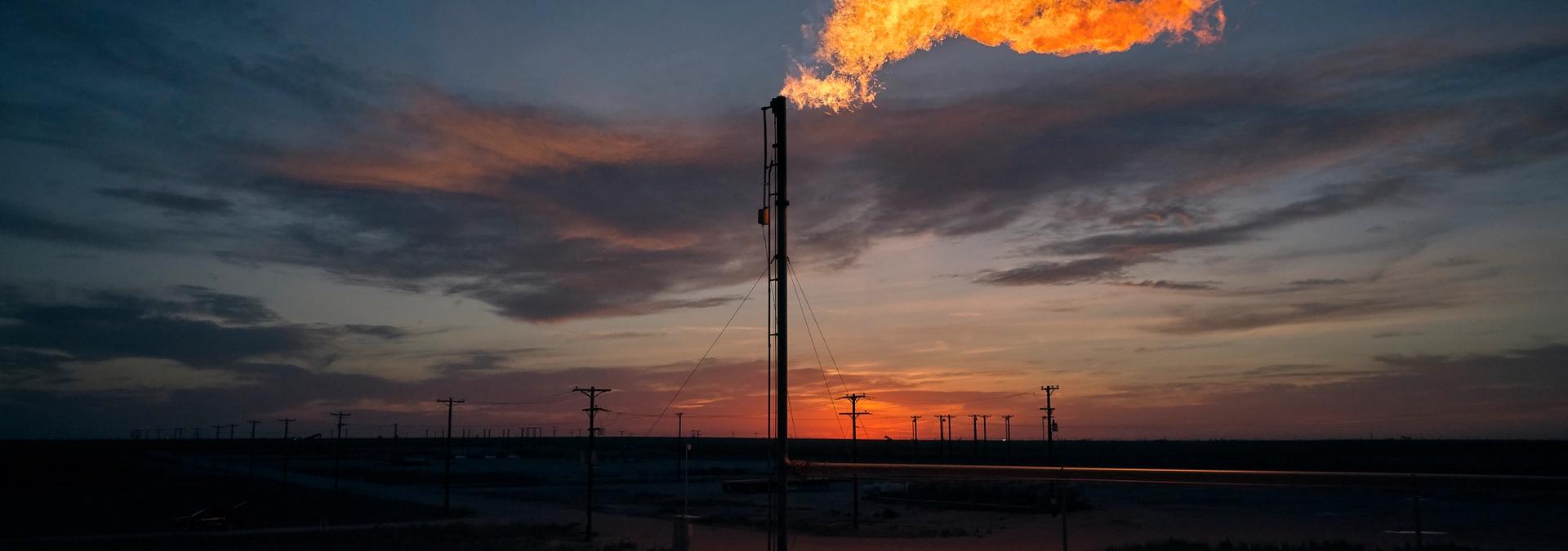
'Some consequences are permanent': A conversation about environmental justice with Virginia Palacios
Flaring off natural gas in the Eagle Ford Shale region has been linked by researchers to an increase in preterm births in South Texas.
Virginia Palacios moved back home to Laredo, Texas, when fracking in the Eagle Ford Shale region started in haste. It was 2011, and advocates were concerned about water contamination, earthquakes and air pollution.
“But most of our elected officials were looking the other way,” she says, “because they were so excited about the money they thought was coming. They hesitated to regulate or do anything to protect the environment and the people.”
She wanted to be part of the solution in her hometown, which faces, she says, unique challenges. It’s 95 percent Hispanic. It’s a border town. And it has a 30 percent poverty rate, a low high school graduation rate. She says, “There are some real systemic problems in this part of the state that are affecting Latinos.”
Since then, she’s been busy in pursuit of solutions, completing a master’s degree and working on environmental issues from carbon sequestration to methane emissions to ecosystem restoration. Now, in Laredo, she is principal of VP Environmental, consulting with GreenLatinos and the Rio Grande International Study Center, among other groups, raising awareness about these issues, she says, “because everybody has to be involved in order to solve climate change.”
This conversation has been edited and condensed for clarity.
AW: Texas is such a vast state, with unique geography, unique problems. You’d need a whole environmental agency just to focus on methane in the Permian Basin or smog in Houston. But TCEQ and the Railroad Commission have a kind of one-size-fits-all approach. What tensions have you seen between the needs of each region and the protections the agencies ought to be pursuing?
VP: Fundamentally, it's pretty clear that the values underpinning statutes and regulations are deferring to protecting wealth. It could be that it's just the leadership in these organizations, but certainly the way that these laws and rules are being interpreted is deferring to that protection of wealth and power, and not people's health.
I think we see that in the study mentioned in the Texas Observer article that just came out on preterm birth for women living next to 10 or more flares in the Eagle Ford Shale. And Latinas experiencing the brunt of those impacts have 50 percent higher odds of preterm birth because of being exposed to high levels of flaring.
What that tells me is that, even though we've known for a long time what kinds of chemicals are coming out of these flares and out of venting, and we've known there are health issues associated with those kinds of chemicals, with volatile organic compounds, polycyclic aromatic hydrocarbons and particulate matter, this state has not done very much to proactively regulate and prevent the preterm births in the first place.
It's like we have to wait for studies to come out. Even then we see people saying, Well, maybe it's not as bad as it seems. Or, Maybe we need more studies.
It's frustrating, because it makes it feel like there's never going to be enough information to convince our regulators to protect us. More people are going to be harmed before we get the kinds of regulations we need.
AW: I am going to quote you back to yourself from that story. You said, “We shouldn't need a zillion more studies before we proactively protect people.” These aren’t novel threats.
VP: There needs to be some transition that changes that balance in terms of how the agencies regulate. It can't be so lopsided toward wealth and industry that people's health is completely ignored.
And the other issue, other than that imbalance, is that there are all these rulemaking and permitting processes that require public participation, but too often it feels like that participation is not meaningful. The agencies do it just to check a box. The comments and concerns and values brought up in those community conversations are not acted upon by the agencies or the companies.
For example, there was the Dos Republicas coal mine in Eagle Pass. That permit application was in dispute for decades. It came up for dispute again in the 2010s. And almost all of Maverick County and the town of Eagle Pass were against it. Even elected officials were saying, Look, we don’t need this. We don’t need the jobs the mine is going to bring, because we don't want that polluting activity taking place here. And the Railroad Commission granted the permit anyway.
Pretty soon after, there were fish kills in a tributary to the Rio Grande. I'm not sure if it was because of the fish kills, but the wastewater discharge permit for the mine was revoked, eventually.
We like to think we live in this democracy where people have a say, but in certain arenas, we just don't. And that’s seen pretty drastically when it comes to our state agencies, like TCEQ, like the Railroad Commission, where people can speak out against pollution en masse, and it still gets approved.
We need meaningful participation in permitting and siting and rulemaking that considers whether the public wants this thing to exist or not. We need to figure out better processes for that. We need to change the values underpinning our laws, to say there's not automatically a social license to operate for industry unless they can prove to the public that they are doing things clean and well.
The public should have a say, because right now that social license to operate is effectively granted by the agencies. The public has to prove it's not going to be safe. The burden of proof is on who’s being impacted, and it should be the other way around.
AW: A story that came out after Hurricane Laura was about Mossville, Louisiana, which is right outside Lake Charles. You could tell the story about East End in Freeport or some neighborhoods in Houston. Industry continues to encroach, expand. It creates sacrifice zones. Michele Roberts with the Environmental Justice Health Alliance said, "I pray that someone hears what these community members are asking for — to be lifted up out of harm's way and to be made whole.” How do you make whole communities who've been expected to live with these impacts? How do you make whole a mom in the Eagle Ford Shale region whose child has been sacrificed for a private company's profit?
VP: I don't think you can.
I think it's easy to imagine that you can make somebody whole, if their home’s in harm's way, if they need to be relocated and compensated for that relocation. It's not a perfect solution all the time, but it can be imagined.
But when it comes to preterm birth, there's nothing you can do to take that back. Some of these consequences are permanent.
AW: Exxon Mobil was removed from the Dow Jones in late August. They're now worth $175 billion, the Chronicle reported, down from $400 billion in 2011. There's a cliche in Texas that the smell of pollution is the smell of money. But we know the impacts. Industry is hurting and killing Texans. Where does Texas go from here? Can industry be part of the solution? What has to happen so we don't have an economy based on the need for sacrifice zones?
VP: I think it’s time for industry to start seeing the writing on the wall and make plans for how they're going to manage lower demand for their products in the future and, possibly, more aggressive regulations.
In an ideal world, people who work in these industries would recognize the humanity of the communities and the people who have been impacted for generations and start to see that there are better ways to do business and not just lobby their way into being able to do whatever they want.
But we're at an interesting time when global oil prices have caused this crash in the market. A lot of people have lost their jobs. I think prices will probably rebound. They usually do. But both policymakers and industry need to think about what to do to make these businesses appropriately scaled, so that we can manage the decline of these fuels. I'm sure it sounds ridiculous to companies that got into the industry just to make money. But a prudent business operator needs to be able to identify the decline of their industry and make plans.
There are people with these jobs. This is what they do. They’re petroleum engineers. They manage hydraulic fracturing programs. That is their niche and their specific skill. There need to be pathways for job transitions. Industry needs to take that seriously and do the right thing helping connect laid-off workers with the next step. It can't only be the role of government to invest in clean energy and create new jobs. It can't only be the role of environmental nonprofits to imagine what transferable skills workers have. Industry knows that better than anybody else and should be figuring out a transition plan.
This is about imagining a future that's not only low-carbon, but includes a redistribution of power and choice. Those are the fundamental values. The way industries and agencies exert power leaves very, very little power to the people being impacted to have any ability to choose how they’re impacted. There has to be a shift as we change energy sources, as we move out of the coronavirus pandemic, that considers how power is distributed and how it's used. We have to change that.
West is a senior communications specialist for the Environmental Defense Fund. You can follow him on Twitter @allynwest.
STAY UP TO DATE
The quality of our newsletter is considered satisfactory and poses little or no risk.
SUBSCRIBE

